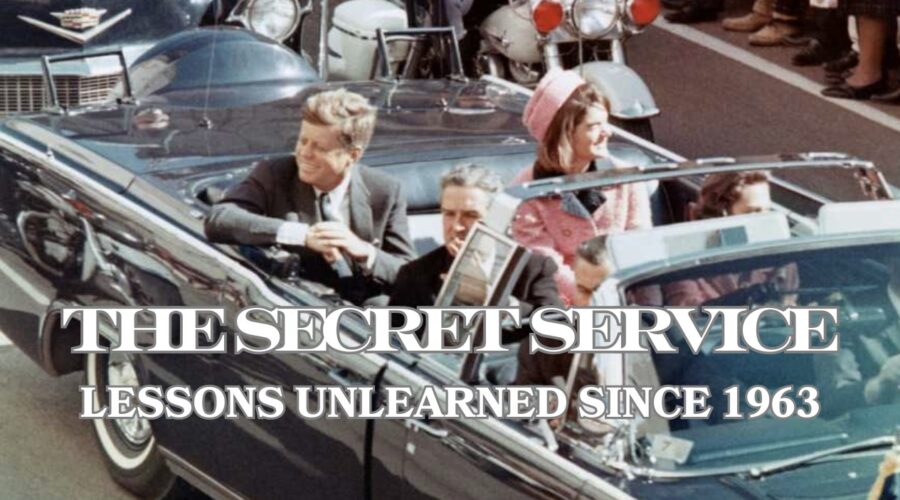Nearly sixty years after JFK’s assassination, recent incidents involving the denial of protection to presidential candidates Robert Kennedy Jr. and Donald Trump, combined with revelations of budget cuts, raise unsettling questions about whether the Secret Service has truly learned from its past mistakes.
In the annals of American history, few events have left as indelible a mark on the national psyche as the assassination of President John F. Kennedy on November 22, 1963. The tragic event not only highlighted the vulnerability of the highest office in the land but also exposed glaring deficiencies in the protective measures provided by the United States Secret Service.
Nearly sixty years later, recent incidents involving the denial of protection to presidential candidates Robert Kennedy Jr. and Donald Trump, combined with revelations of budget cuts, raise unsettling questions about whether the Secret Service has truly learned from its past mistakes.

The assassination of John F. Kennedy was a watershed moment that forever changed the landscape of presidential security. The events in Dealey Plaza revealed a series of lapses, from inadequate intelligence sharing to a failure to adapt security protocols to the threats of the time.
The Warren Commission’s investigation highlighted these failures, leading to significant reforms within the Secret Service. These reforms included the establishment of more rigorous training programs, the development of advanced protective techniques, and the implementation of better coordination with other law enforcement agencies.
Despite these measures, the inherent challenges of protecting a sitting president in an open society remained. The assassination underscored the need for continuous evaluation and adaptation of security strategies to counter evolving threats.
Fast forward to the present day, and it becomes evident that the lessons of 1963 may not have been fully absorbed. Earlier this year, Robert Kennedy Jr., a presidential candidate, was denied Secret Service protection despite his family’s tragic history with political assassinations.
Similarly, former President Donald Trump’s request for additional protection was also reportedly denied. These decisions are perplexing, given the high-profile nature of both figures and the volatile political climate.
The denial of protection to Robert Kennedy Jr. is particularly alarming. As the son of the assassinated Senator Robert F. Kennedy and nephew of President John F. Kennedy, his family history alone would seem to warrant extraordinary protective measures.
The decision to deny his request raises serious concerns about the criteria used to evaluate threats and the processes in place to respond to them. Compounding these issues are recent reports of budget cuts within the Secret Service.
The agency is tasked with the monumental responsibility of protecting not only the current president and vice president but also former presidents and their families. This includes Presidents Clinton, Obama, and their families, all of whom remain high-profile figures with substantial security needs.
The revelation of budget cuts is deeply troubling in an era marked by heightened political polarization and increased threats of violence. The Secret Service’s mandate has expanded significantly since 1963, now encompassing cyber threats and other non-traditional forms of attack. The reduction in resources undermines the agency’s ability to effectively carry out its duties and protect those under its charge.
One of the key challenges facing the Secret Service today is the evolving nature of threats. The rise of domestic terrorism, the proliferation of firearms, and the increasing use of social media to incite violence have all created a more complex security environment. The Secret Service must adapt to these new realities, developing strategies that address both traditional and emerging threats.
The denial of protection to high-profile political figures in this context is particularly concerning. It suggests a disconnect between the perceived level of threat and the agency’s willingness or ability to respond to it.
This disconnect could have disastrous consequences, as it leaves individuals vulnerable to attack at a time when political violence is on the rise. Another factor contributing to the current state of affairs is the interplay of political and bureaucratic constraints. The Secret Service operates within a highly politicized environment, where decisions about resource allocation and protection details are influenced by broader political considerations. This can lead to inconsistencies in the level of protection provided and undermine the agency’s effectiveness.
Moreover, bureaucratic inertia and resistance to change can hinder the implementation of necessary reforms. The Secret Service, like many government agencies, is bound by established protocols and procedures. While these are designed to ensure consistency and accountability, they can also impede the agency’s ability to quickly adapt to new threats and changing circumstances.
Given these challenges, it is clear that comprehensive reform is needed to ensure the Secret Service can effectively fulfill its mission. This includes not only addressing budgetary constraints but also reevaluating the criteria used to assess threats and allocate resources. The agency must also invest in advanced training and technology to stay ahead of evolving threats.
Additionally, there needs to be greater transparency and accountability in the decision-making processes related to protection details. This would help build public trust and ensure that decisions are made based on objective assessments of risk rather than political considerations.
The assassination of President John F. Kennedy was a tragic event that highlighted the vulnerabilities of presidential security and prompted significant reforms within the Secret Service. However, recent incidents involving the denial of protection to high-profile political figures, combined with budget cuts and an evolving threat landscape, suggest that the lessons of 1963 have not been fully learned.
To prevent future tragedies and ensure the safety of those under its protection, the Secret Service must undergo comprehensive reform. This includes addressing budgetary constraints, reevaluating threat assessment criteria, and investing in advanced training and technology.
Only by adapting to the challenges of the modern era can the agency effectively fulfill its mission and protect the leaders of our nation.
In an era of heightened political tension and increased threats of violence, the importance of a well-funded, well-trained, and adaptable Secret Service cannot be overstated.
The safety of our leaders and the stability of our democracy depend on it.
TONY CASTRO, the former award-winning Los Angeles columnist and author, is a writer-at-large and the national political writer for LAMonthly. org. He can be reached at tony@tonycastro.com.





